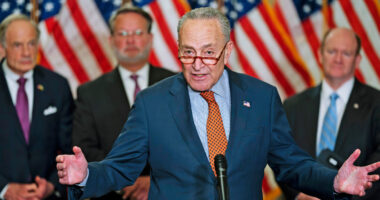
Pfizer and BioNtech asked the FDA last month to authorize their Covid-19 vaccine.
Photo: pfizer/Reuters
The leader of the advisory panel charged with evaluating the first Covid-19 vaccination to come before the U.S. Food and Drug Administration says the shot is very likely to obtain emergency-use authorization.
“I would predict the likelihood of approval is high,” said Arnold Monto, a University of Michigan health researcher who chairs the advisory committee. “We’re not at the borderline on efficacy,” he added, referring to data from the vaccine’s makers— Pfizer Inc. and Germany’s BioNtech SE—showing the shot is 95% effective at protecting against Covid-19, significantly higher than the 50% minimum the FDA had said would be required for an emergency authorization.
The little-known panel, the Vaccines and Related Biological Products Advisory Committee, plays an important role in vaccine rollouts in the U.S., ensuring that the protective shots pharmaceutical companies want to offer to the American public work safely enough to be cleared for use. It meets regularly to review flu vaccines and occasionally on experimental vaccines.
On Thursday, 23 members of that committee will evaluate the first among what public health experts say eventually could be a suite of vaccines to help turn the tide of the global coronavirus pandemic, which has killed over 1.5 million people world-wide, according to Johns Hopkins University.
The advisory panel will play a key role in the FDA’s review. Its members include infectious-disease experts, professors and practicing physicians, as well as a lawyer and some doctors from the Department of Health and Human Services. The committee has been reviewing the data from Pfizer’s trial since last week.
The meeting begins at 9 a.m. ET on Thursday and will be livestreamed on YouTube. The panelists will appear remotely via videoconference. The committee will meet in open session and hear presentations from the FDA; an update on the Covid outbreak; details about the safety and effectiveness of the vaccine and distribution plans; Pfizer’s findings; and a question-and-answer period, before voting.
The committee also will discuss a key ethical question, according to its draft agenda: What to do about volunteers in Pfizer’s clinical trial who received a placebo and will likely request the vaccine if it is authorized. Taking them off the placebo could adulterate trial data and compromise other companies’ vaccine trials if their volunteers drop out to get Pfizer’s vaccine. Still, companies must tell trial volunteers if they are eligible for an authorized vaccine, ethicists say.
The panel will be asked to determine whether the data demonstrate that the vaccine can protect against Covid-19 in people over 16 years old and whether the benefits of the vaccine outweigh the risks. It will vote on whether it endorses the FDA’s plan to grant an emergency authorization. A favorable recommendation from the panel is expected, and the FDA usually follows the recommendations of the advisory committee.
“You want us to review this, to make sure that there’s nothing hidden here, no safety concerns that weren’t clear from [Pfizer’s] press release.” said Paul Offit, an infectious-disease doctor and director of the Vaccine Education Center at the Children’s Hospital of Philadelphia who is a member of the committee.
Pfizer’s is the most-advanced vaccine candidate in the West. It released data last month, saying its vaccine was 95% effective and generally safe. The U.K. authorized the vaccine last week, and became the first Western country to give a vaccine to its population Tuesday.

Dr. Paul Offit, director of the Vaccine Education Center at the Children’s Hospital of Philadelphia, is a member of the FDA advisory panel.
Photo: Matt Rourke/Associated Press
Pfizer and BioNTech asked the FDA to authorize their vaccine on Nov. 20. In an analysis released Tuesday, FDA staff said the Pfizer-BioNTech vaccine reduced the risk of getting severe Covid-19 even after the first of two prescribed shots. It said additional data are needed to determine whether vaccinated people can still spread Covid-19.
Health experts have looked to the committee’s meeting as a key step toward educating the public about the experimental Covid-19 vaccines, and overcoming concerns their development was rushed. They hope for widespread uptake so that Americans develop herd immunity to protect everyone against the virus and allow the country to fully reopen.
The percentage of Americans saying they are likely to get a vaccine ticked back up to 60% in November, according to Pew Research. The figure had fallen to 51% in September from 72% in May, as confidence in the development process declined, said Pew.
Independent review of the data by the committee builds confidence in that process, said Dr. Aaron Kesselheim, a professor of medicine at Harvard Medical School. The FDA is following a conservative protocol, asking the independent committee to sign off on the safety and effectiveness of the shot before authorizing it, despite the desire to get a vaccine out quickly, Dr. Kesselheim said.
Earlier this year the FDA issued emergency-use authorization—without an independent review of data by a similar advisory committee—for experimental therapies to fight Covid-19 infections including remdesivir, convalescent plasma and antibody drug bamlanivimab, permitting use of the treatments on hospitalized Covid-19 patients. One such authorization, for the antimalaria drug hydroxychloroquine, was later revoked after data suggested it could do more harm than good.
Dr. Kesselheim, who isn’t on the advisory panel, also said tweets by President Trump promoting conspiracy theories substantially eroded public trust in the vaccine.
Vaccines that are rolled out too quickly can be risky.
Anxious to prevent Dengue fever outbreaks, authorities in the Philippines pushed to vaccinate children with Dengvaxia, a Sanofi SA vaccine, beginning in 2015. Two years later, Sanofi said new data showed that in some people the vaccine could actually make Dengue infections worse and asked global health authorities to stop recommending it for some people.
Confidence in vaccines plummeted in the Philippines afterward, contributing to a measles outbreak in 2019 that infected tens of thousands and killed hundreds.
Dengvaxia was approved for use in the U.S. in 2019. The advisory committee voted to approve it but recommended use for children only in certain cases. The FDA approved the vaccine for use in line with the committee’s recommendation.
Write to Rolfe Winkler at [email protected]
Copyright ©2020 Dow Jones & Company, Inc. All Rights Reserved. 87990cbe856818d5eddac44c7b1cdeb8









